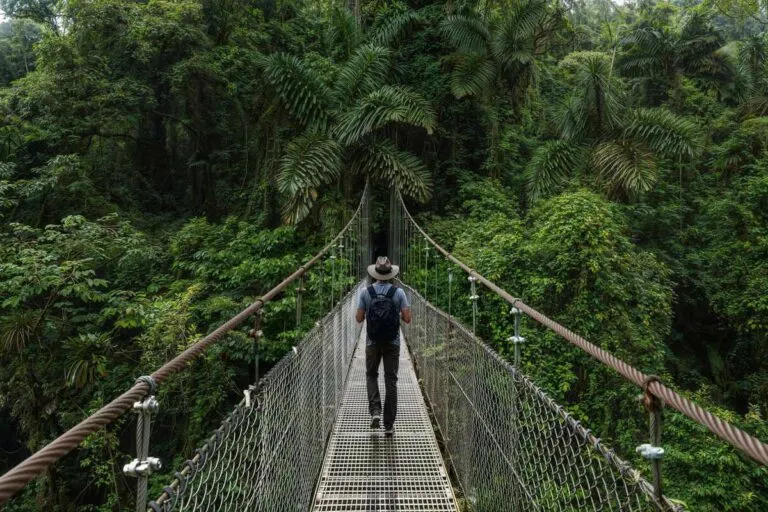We all know Central America for its lush jungles, unspoiled beaches and vibrant Hispanic culture, and in recent years, numerous countries in the region have made great strides in becoming more accessible to tourists, be it improved connectivity or increased safety levels.
We’ve had El Salvador, which went from one of the murder capitals of the world to one of its safest; Panama, which’s seen a sharp increase in demand due to its affordability; and even Nicaragua, which is rising on the tourism charts, with a 125% surge in arrivals.
As great as all of those sound, no Central American country is yet to surpass Costa Rica, the unstoppable regional leader heading towards a record number of visitors:
How Is Costa Rica Performing In Tourism?
As confirmed by the Costa Rican Institute of Tourism (known by its Spanish acronym ICT), a total of 2.181.899 tourists have landed in Costa Rica between January and October of 2024, already a 10.3% increase over 2023.
If the trend continues––and we have reason to believe it will––this will be the country’s biggest year in tourism so far, with 2.7 million arrivals projected, with a particular increase in American and European arrivals noted.

So what is it about Costa Rica that has got U.S. travelers so enthralled, and most importantly, should you be considering visiting this winter, instead of yet another all-inclusive getaway to Cancun that barely stirs up real excitement anymore?
Why Is Costa Rica So Popular?
First off, Costa Rica is nothing short of paradise for nature enthusiasts, comprising a volcano-traversed hinterland, cloud and rainforests, rich fauna, and with extensive coastlines on both the Caribbean and Pacific coastlines.

It’s home to a plethora of national parks, including Manual Antonio, where you’ll find unspoiled beaches and abundant wildlife, with sloths and rare birds living in the wild, Corcovado National, inhabited by the elusive jaguar, and the Monteverde Cloud Forest Reserve:
A biodiversity haven cut through with beginner-friendly trails and suspension bridges, it is a must-see in Costa Rica, though if you’re looking for something a little more adventurous, the imposing Arenal Volcano offers many opportunities for hiking and zip-lining.

Is it relaxation you’re after? Rincón de la Vieja is extremely popular for its volcano-originated hot springs and towering waterfalls, that empty into serene, natural pools, and let’s not forget Tortuguero and its unruffled Caribbean sandbars.
It Is An Incredibly Tourist-Friendly Country!
With so much to see and do, you may be wondering how difficult it is to get around Costa Rica: the answer is not difficult at all, and that’s precisely one of the reasons why it’s placing ahead of its Central American counterparts when it comes to popularity!

This is a very tourist-friendly country, smaller in size than the state of West Virginia, at that, and you can book excursions visiting most of its natural sites, whether you’re based in San Jose, the national capital, or La Fortuna, the gateway to the volcanos.
From the former, you can go on a guided tour of the Poás Volcano, stopping by at the majestic La Paz Waterfall ($139), take a boat out to Isla Tortuga, and snorkel and swim in turquoise waters ($115), or even reach the base of Arenal Volcano and admire views of coffee plantations ($159).

If you’re based in La Fortuna, an admission ticket to walk the world-famous Místico Arenal Hanging Bridges will only set you back by $28 (transfers not included), and for the thrill seekers out there, rafting at the foot of the volcano costs from $85 per person.
All of these incredible activities (and many more) are available on GetYourGuide.
Is San Jose One Of The Most Underrated Capitals In Latin America?
We all know Mexico City for its diverse neighborhoods, Buenos Aires for the fine-dining scene, and Rio de Janeiro for the postcard-ready beaches, but what about Costa Rica’s often-overlooked San Jose? Have we underestimated it all along?

Costa Rica’s biggest appeal to travelers may be its breathtaking nature, and rightly so, but the national capital has just as much to offer on the culture front, with its vast collection of Spanish-colonial buildings, city parks, and vibrant street markets.
For great street food at affordable prices, head over to the Central Market, a maze-like messhall filled with rows upon rows of vendor stalls, where you can get hot snacks, traditional crafts, and delicious Costa Rican coffee, said to rival Colombia’s in quality.

Costa Rica is not exactly known to be on the cheaper end of Central America, so if you’re looking to avoid the overpriced restaurants only gringos go, make sure you add La Muny to your list: it’s likely that not a word of English will be spoken, but the ceviche and fried yuca are superb, and it’s all local prices.
Safety Levels Are O.K.
A lot has been said on the improvement of safety in Central America as of late, particularly after Nayib Bukele came into power in El Salvador and successfully managed to smash gangs––not without controversy, if you’re a fierce defender of overreaching Human Rights.

Costa Rica has always been considered one of the safest in this community of nations, but that’s not to say crime isn’t a widespread concern: from pickpocketing to armed robbery, American tourists remain subject to higher safety risks than at home.
As the U.S. State Department reiterates, Americans should exercise ‘increased caution’ when visiting; still, most visits are hassle-free, and it should come as a reassurance that local authorities are in talks with El Salvador’s savior to tackle their own crime statistics.
For now, U.S. tourists are not discouraged from traveling to Costa Rica, as it remains a Level 2 destination, but they must take precautions, such as booking activities through reputable providers, avoid exploring jungle areas unaccompanied, and being aware of their surroundings.
Credit: Source link

